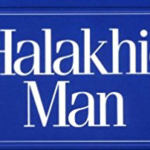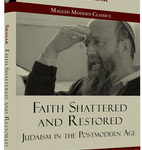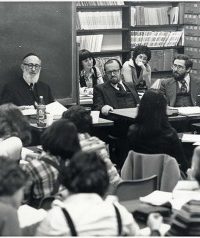BY: Jake Friedman
Tradition seldom records the formative events in the lives of great Jewish figures as taking place in a classroom full of students; the journeys of the Torah greats began with profoundly personal experiences. Abraham’s monotheistic epiphany started with meditation upon the heavens; Moshe’s unparalleled career as leader and prophet began with a prophecy in the wilderness; R. Akiva’s fabled dedication to limmud Torah was inspired by his contemplation of a water-pierced rock; Reish Lakish’s legendary ascent to becoming one of the heads of the Amoraim was spurred by his fateful encounter with R. Yohanan.
Jewish day school educators face a problem: they are expected not just to inform students or teach them academic skills, but also to help them take their first steps on their lifelong religious journeys. This mission is not always easily executed in an institutional setting because just like the heroes of Judaism, every person’s internal source of religious devotion must be tapped through a deeply personal experience. Is there some approach in education that can lead students closer to their own profound religious experiences? Or must the Jewish educator resign himself or herself to the job of merely filling students’ minds with information while hoping that they might unlock their own religious potential?
My own Jewish education was not merely an accumulation of information. As I studied in school, I underwent earnest religious development, but not as the result of hands-on mentoring or exceptionally inspirational classroom experiences. My teachers prepared me to hone my religious sensibilities by arming me with the tools and attitude necessary for deciphering Torah texts on my own. Their commitments to the detail-oriented, “boring” subjects of Hummash grammar and Gemara vocabulary meant that, even as a young student, I acquired a considerable degree of independence in the fundamental process of reading and translating. With these basic skills, I was capable of delving unaccompanied, albeit not very far, into unfamiliar Torah texts. My unchaperoned excursions into uncharted Torah territory comprised my seminal “profoundly personal experience” and formed the basis for a process of ongoing religious development that accompanied my scholastic career.
In answering the question of how educators can provide students with religious independence, I look towards my own experiences in the Jewish educational system. It seems that within the confines of today’s day school system, there is no direct way to train students to follow the meditative model set by the patriarchs. The modern Jew’s religious development depends heavily on his or her ability to intellectually engage Torah texts. Nowadays, the relationship between Torah study and religious contemplation seems to be reversed; whereas the ancients experienced religious enlightenment that led them to Torah, today’s students can be brought to their own religious awakenings by way of Torah study. Therefore, the educational system should be constructed in a way that ensures that students are equipped to study texts on their own, independent of the overly emphasized authority of their teachers’ interpretations.
When a student encounters a text without the authoritative voice of the teacher imposing a single interpretation upon it, that student is exposed to the unadulterated gamut of interpretational possibilities presented by the text. Responding to the need to make sense of the words, a student must draw on his or her own experiences and imagination to make the text work for him or her. Also, importantly, the student’s private reflection on the text brings him into confrontation with the text’s relationship to subjects too taboo for most teachers to deal with explicitly – whether because of theological awkwardness, ideological awkwardness, or relation to sexuality and sexuality’s ubiquitous connection to religious imperfection. Some might claim that such student-originated readings pose dangers of theology and decorum; however, I think the opposite is true. Only this kind of personal encounter can impress upon a student the borderless scope of the Torah’s relevance to life. The student’s first steps in those daunting fields of meaning are also his or her first steps toward developing a thoughtful and personally meaningful devotion to religion. The departure from the coddling safety of the classroom into the peril of personal mental space marks the commencement of a personal religious journey.
Mikhail Bakhtin, a 20th-century literary critic, develops in some of his literary criticism a particular perspective on the maturation of human consciousness through reading. He sees the significance of the act of reading as a modulation between authoritative discourse and internally persuasive discourse.
Authoritative discourse is static. It is a language that approaches us from without; it is distanced, sacred, and does not permit us to play with its interpretive possibilities. We merely recite it. If we try to remove it from its original context, it immediately becomes a dead thing, a relic. Torah, as taught by those who disregard its relevance to the totality of human thought, emotion, and experience, is taught as authoritative discourse.
Opposed to it is internally persuasive discourse, which is more akin to a retelling of the text than to a recitation. The telling over of a text in one’s own words, with one’s own accents, gestures, and modifications, breathes a life into the text that was not there before. This process forms a bond between the text and the reader. The act of reading and deciphering Torah texts on one’s own is fundamental to enabling Torah to become an internally persuasive discourse. The text can begin to have personally meaningful significance only when viewed through the private interpretive lens of the student.
Today’s teachers need to stop asking students to recite their lessons and start asking them to retell them in their own words. It was truly alarming to arrive in Israel for my stint in yeshivah and find that my colleagues had little knowledge of Gemara vocabulary but extensive knowledge of vague meta-Talmudic concepts, half-explained by teachers who paid little attention to fundamental reading skills in their lessons.
As I plan to teach in the future, I am eager to teach students in a way that invests them with the ability and responsibility to independently read and interpret texts. Undoubtedly, this process is slow-going for the novice, but the value for his or her religious life in the long-term is incalculably high.
Jake Friedman is a senior at YC majoring in Philosophy and is a Staff Writer for Kol Hamevaser.






Reading Toward Religious Identity
BY: Jake Friedman
Tradition seldom records the formative events in the lives of great Jewish figures as taking place in a classroom full of students; the journeys of the Torah greats began with profoundly personal experiences. Abraham’s monotheistic epiphany started with meditation upon the heavens; Moshe’s unparalleled career as leader and prophet began with a prophecy in the wilderness; R. Akiva’s fabled dedication to limmud Torah was inspired by his contemplation of a water-pierced rock; Reish Lakish’s legendary ascent to becoming one of the heads of the Amoraim was spurred by his fateful encounter with R. Yohanan.
Jewish day school educators face a problem: they are expected not just to inform students or teach them academic skills, but also to help them take their first steps on their lifelong religious journeys. This mission is not always easily executed in an institutional setting because just like the heroes of Judaism, every person’s internal source of religious devotion must be tapped through a deeply personal experience. Is there some approach in education that can lead students closer to their own profound religious experiences? Or must the Jewish educator resign himself or herself to the job of merely filling students’ minds with information while hoping that they might unlock their own religious potential?
My own Jewish education was not merely an accumulation of information. As I studied in school, I underwent earnest religious development, but not as the result of hands-on mentoring or exceptionally inspirational classroom experiences. My teachers prepared me to hone my religious sensibilities by arming me with the tools and attitude necessary for deciphering Torah texts on my own. Their commitments to the detail-oriented, “boring” subjects of Hummash grammar and Gemara vocabulary meant that, even as a young student, I acquired a considerable degree of independence in the fundamental process of reading and translating. With these basic skills, I was capable of delving unaccompanied, albeit not very far, into unfamiliar Torah texts. My unchaperoned excursions into uncharted Torah territory comprised my seminal “profoundly personal experience” and formed the basis for a process of ongoing religious development that accompanied my scholastic career.
In answering the question of how educators can provide students with religious independence, I look towards my own experiences in the Jewish educational system. It seems that within the confines of today’s day school system, there is no direct way to train students to follow the meditative model set by the patriarchs. The modern Jew’s religious development depends heavily on his or her ability to intellectually engage Torah texts. Nowadays, the relationship between Torah study and religious contemplation seems to be reversed; whereas the ancients experienced religious enlightenment that led them to Torah, today’s students can be brought to their own religious awakenings by way of Torah study. Therefore, the educational system should be constructed in a way that ensures that students are equipped to study texts on their own, independent of the overly emphasized authority of their teachers’ interpretations.
When a student encounters a text without the authoritative voice of the teacher imposing a single interpretation upon it, that student is exposed to the unadulterated gamut of interpretational possibilities presented by the text. Responding to the need to make sense of the words, a student must draw on his or her own experiences and imagination to make the text work for him or her. Also, importantly, the student’s private reflection on the text brings him into confrontation with the text’s relationship to subjects too taboo for most teachers to deal with explicitly – whether because of theological awkwardness, ideological awkwardness, or relation to sexuality and sexuality’s ubiquitous connection to religious imperfection. Some might claim that such student-originated readings pose dangers of theology and decorum; however, I think the opposite is true. Only this kind of personal encounter can impress upon a student the borderless scope of the Torah’s relevance to life. The student’s first steps in those daunting fields of meaning are also his or her first steps toward developing a thoughtful and personally meaningful devotion to religion. The departure from the coddling safety of the classroom into the peril of personal mental space marks the commencement of a personal religious journey.
Mikhail Bakhtin, a 20th-century literary critic, develops in some of his literary criticism a particular perspective on the maturation of human consciousness through reading. He sees the significance of the act of reading as a modulation between authoritative discourse and internally persuasive discourse.
Authoritative discourse is static. It is a language that approaches us from without; it is distanced, sacred, and does not permit us to play with its interpretive possibilities. We merely recite it. If we try to remove it from its original context, it immediately becomes a dead thing, a relic. Torah, as taught by those who disregard its relevance to the totality of human thought, emotion, and experience, is taught as authoritative discourse.
Opposed to it is internally persuasive discourse, which is more akin to a retelling of the text than to a recitation. The telling over of a text in one’s own words, with one’s own accents, gestures, and modifications, breathes a life into the text that was not there before. This process forms a bond between the text and the reader. The act of reading and deciphering Torah texts on one’s own is fundamental to enabling Torah to become an internally persuasive discourse. The text can begin to have personally meaningful significance only when viewed through the private interpretive lens of the student.
Today’s teachers need to stop asking students to recite their lessons and start asking them to retell them in their own words. It was truly alarming to arrive in Israel for my stint in yeshivah and find that my colleagues had little knowledge of Gemara vocabulary but extensive knowledge of vague meta-Talmudic concepts, half-explained by teachers who paid little attention to fundamental reading skills in their lessons.
As I plan to teach in the future, I am eager to teach students in a way that invests them with the ability and responsibility to independently read and interpret texts. Undoubtedly, this process is slow-going for the novice, but the value for his or her religious life in the long-term is incalculably high.
Jake Friedman is a senior at YC majoring in Philosophy and is a Staff Writer for Kol Hamevaser.